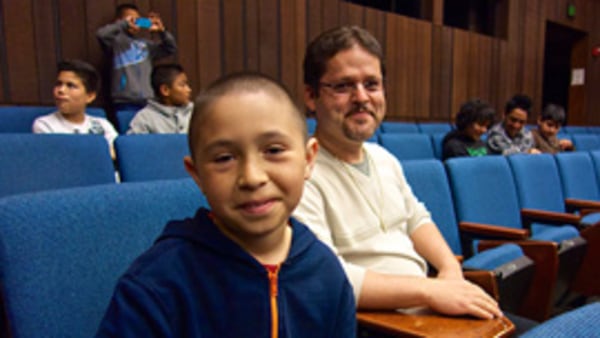Award-winning filmmaker Laura Pacheco thought about it for the first time after reading a New York Times article in 2011. The story was about Oscar Ramos, a third grade teacher in Salinas, California, who came from a migrant family. Ramos teaches in Sherwood Elementary School, where half of his class is made up of children of migrant farmworker families. Often these children have to move several times a year to follow the harvest and have to wake up at 3am to go to a babysitter, before school, so their parents can go work in the fields.
“I couldn’t stop thinking about it,” said Pacheco. “He knows what’s missing in these kids’ lives,” said Pacheco about Ramos.

There are more than 2 million farmworkers in the U.S., and their median wage is alittle over $9 an hour. Immigrant farmworkers (approximately 75 percent are coming from Mexico) often leave their home countries to seek a better life for their families. However, the average migrant child may attend as many as three different schools in one year, often making it difficult for a child to advance to the next grade level.

Pacheco was so intrigued by these figures that she wrote Mr. Ramos and told him she’d like to meet and talk to him about making a film. Together with co-director Jackie Mow, they decided to focus on one family, and one boy in particular, José Anzaldo.
“We decided to follow one to get an intimate look of what a migrant family is like in America,” says Pacheco.
After three years of filming, their film, “East of Salinas” will be premiering on PBS’ Independent Lens on Monday, December 28th. (10pET, see PBS for local listings).
Jose’s mother, Maria, is from Mexicali. She used to work in a clothing factory, but she couldn’t support herself and her children. Jose’s stepfather is from El Salvador, where he also did agricultural work, but he says, “You can live there, but you were always hungry.”
Coming to the U.S., the family still often goes to bed hungry, but not as much. José loves school, especially math, but he is one of two million undocumented children living in the U.S. today. He is María’s only son who was not born in the U.S. – so she worries about his undocumented status and what that portends for his future.
Pacheco and Mow were able to follow José around since the 3rd grade. He’s already attended more than five schools and is now in 7th grade. He’s continuing to do really well in school, said Pacheco.
“In the beginning, he’s a little naive about his situation, and at the end he becomes more aware,” said Pacheco. “It’s really hard to see someone’s potential, and then leave and not know if he’s going to have food the next day – Oscar (his teacher) still goes to see them and takes the boys to the movies.”
His teacher Oscar Ramos sees the little boy’s promise and wants to help him get ahead. The question is, what opportunities will be available for children like José, a bright student who is undocumented?

Pacheco hopes viewers take away certain things from watching the film such as what education is like for farmworker children and where our food is coming from.
“But if I had to say one thing, I hope José lives in people’s hearts,” says Pacheco. “Immigration is a hot topic right now. It gets so polarized. People feel so righteous on both sides of the debate, but you can see who the kids are that are going to make America great and should be given an opportunity.”
“These are the families who are picking food for America,” says Pacheco. “We should know what their lives are like.”
“East of Salinas” will premiere at 10pET on Monday, Dec. 28th, see local PBS stations for times and schedule.
